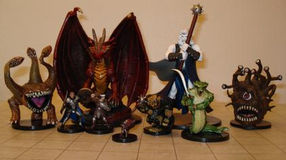The Craft of Character Creation
- Caity Kelly
- Nov 3, 2017
- 3 min read
"Plot is no more than footprints left in the snow after your characters have run by on their way to incredible destinations."
-Ray Bradbury, Zen in the Art of Writing

This quote by Ray Bradbury is near and dear to my heart as an avid writer and movie/book/video game fanatic. I cannot count the number of times I have encountered the following scenario after watching a new film or TV show:
The story is over--time to evaluate. Special effects? Incredible. Plot? Exciting. Overall satisfaction with the film? Lacking.
Why do I find myself dissatisfied with my experience? Nine out of ten times, it is because the actors and/or characters left much to be desired. While visual effects and plot uniqueness are certainly important, they are a mere enhancement to what should be the main focus of most stories--the people. Characters drive the drama; the suspense; the excitement. Their personalities are a point of fascination and their motivations and reactions give us a chance to live semi-vicariously in their world as we delve into their minds.
Although character creation is a point that on harp on quite intensely, I do acknowledge the challenge that goes into this craft. Every time a play a role-playing video game, it can take me hours to merely design the individual's appearance. Mystery dinner characters are far more difficult. Displayed in the photo above, the characters I create for these activities must have distinct personalities, significant actions/dialogue, and interesting motivations. It is an exhausting, intensive process--particularly when many players are involved. To aid with this arduous endeavor, I came across an interesting article with tips for brand new character designers:
https://geekandsundry.com/rpg-character-building-tips-for-beginners/
This article offers helpful advice for players who decide to make role-playing game characters for hobbies such as Dungeons & Dragons. It includes such tips as creating alternate versions of the player's own self. This could be a clone of herself/himself that exists in the game's setting or perhaps a wicked alter ego of herself/himself. Using this strategy allows for a degree of ease that can greatly help new players to develop their gaming skills.
Personally, I am drawn to this approach and have used it countless times. On several occasions, I have been encouraged to assign characters to individuals that directly conflict with their personalities. "It'll force them out of their comfort zones!" People would tell me. Having hosted a number of these events, I can confidently confirm that this approach is not suitable for new players. The stress of trying to remember new rules combined with acting in a manner that feels unnatural saps a large portion of enjoyment from the newbies.
During my mystery dinner writing career, I used personalty quizzes and simple psychometric questionnaires to assess the nature of players with whom I was not familiar. Using this information, I was then able to create fitting characters for each person. My players loved it. They felt comfortable in what were essentially their own shoes. Consequently, they felt more motivated to come out of their shells and truly enjoy themselves.

For games that require the players themselves to make their own characters, like D&D, the article suggests mapping out their character's own motivations before the campaign begins. Alternatively, players could heavily base their creations on characters that already exist in movies, TV, books, or video games. After all, preexisting fictional individuals already have established personalities and motivations.
While it may seem excessive at the beginning of a new plot, I strongly concur with the article's suggestions. The key to good characters--and by extension, a good story--is to carefully consider why they look, act, and behave the way they do. Take that extra time. Write out their backstories. Decide on their thoughts and feelings about their lives. Sketch out their personalities. Create a person--not a caricature.
I certainly do not deny that plot, setting, and aesthetics are a vital factor in any form of entertainment. However, they tend to become dull when paired with shallow characters. Character development is the key to story enrichment and will make your tale something that truly stands out in your viewers'/players' memories.


Comments